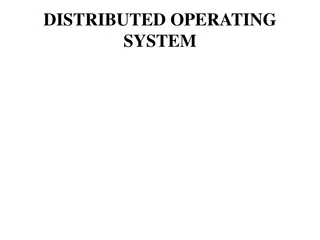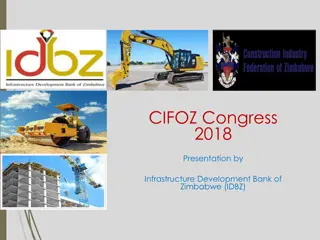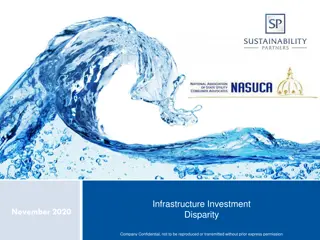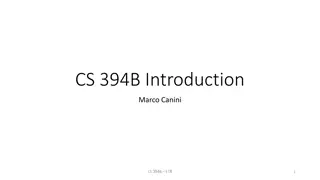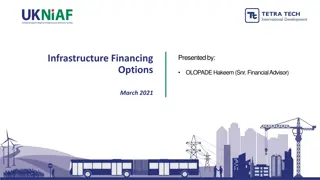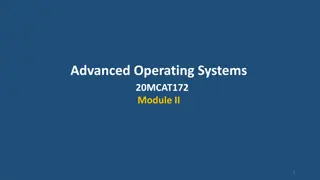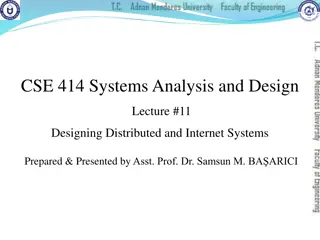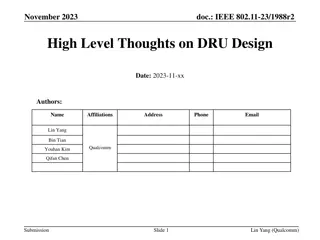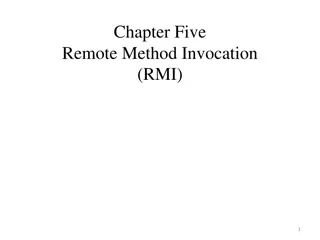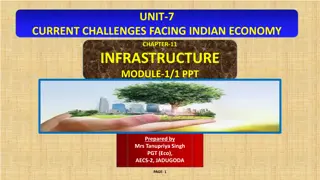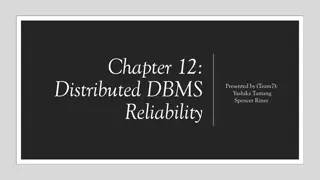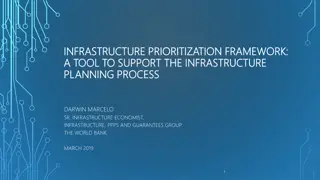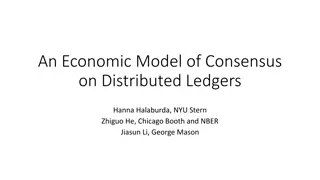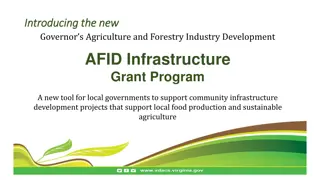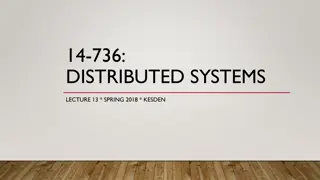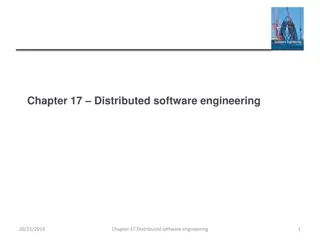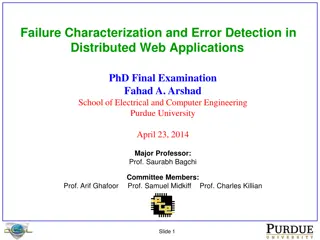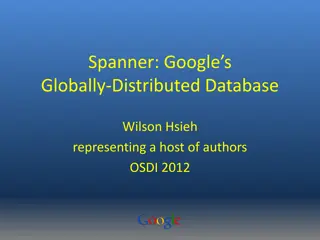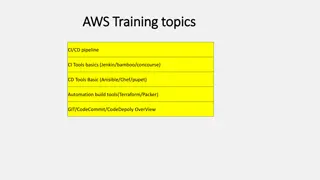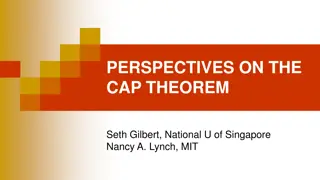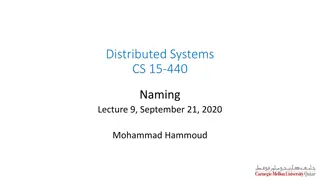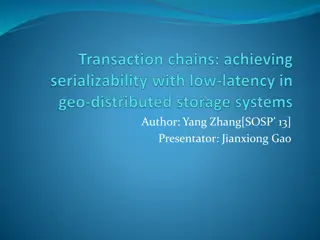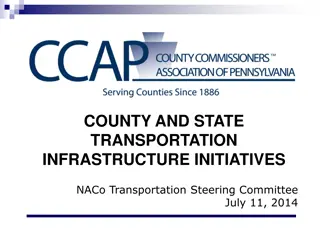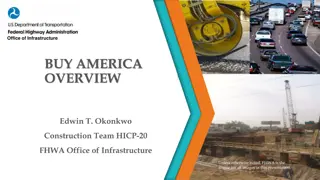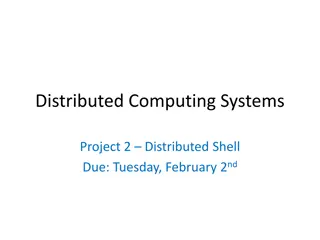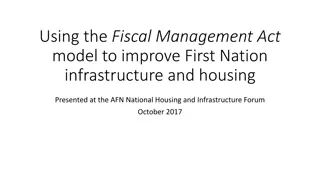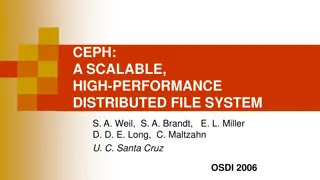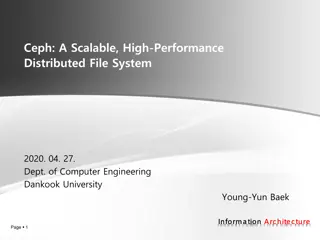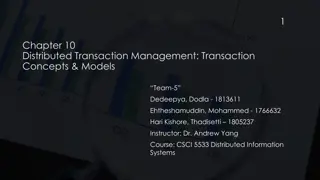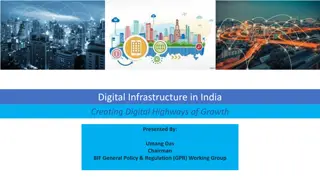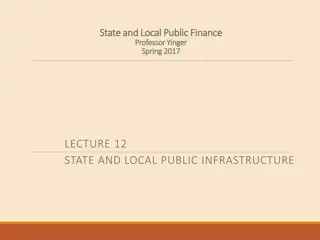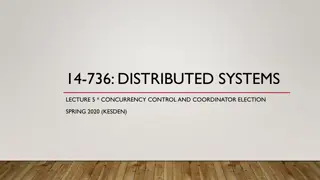Challenges and Progress in Chilean Infrastructure Development
The challenges of Public-Private Partnerships (PPPs) in Chile within the framework of best practices and international standards are discussed, highlighting the need for long-term infrastructure planning and enhanced governance. The 2017 OECD Infrastructure Governance Review identified deficiencies
4 views • 40 slides
Infrastructure Programme Implementation Plan (IPIP) - Module 7 Overview
Module 7 of the Infrastructure Delivery Management System (IDMS) focuses on the Infrastructure Programme Implementation Plan (IPIP). It provides guidance to programme managers on applying management principles for effective planning and management of infrastructure projects. The module emphasizes sy
3 views • 33 slides
Overview of Distributed Systems: Characteristics, Classification, Computation, Communication, and Fault Models
Characterizing Distributed Systems: Multiple autonomous computers with CPUs, memory, storage, and I/O paths, interconnected geographically, shared state, global invariants. Classifying Distributed Systems: Based on synchrony, communication medium, fault models like crash and Byzantine failures. Comp
9 views • 126 slides
Overview of Distributed Operating Systems
Distributed Operating Systems (DOS) manage computer resources and provide users with convenient interfaces. Unlike centralized systems, DOS runs on multiple independent CPUs and prioritizes software over hardware. It ensures transparency and fault tolerance, with a focus on software error handling.
1 views • 36 slides
Infrastructure Development Bank of Zimbabwe (IDBZ) - Financing Zimbabwe's Infrastructure Needs
The presentation by the Infrastructure Development Bank of Zimbabwe (IDBZ) at the CIFOZ Congress 2018 outlines the critical infrastructure sectors, funding requirements, and the funding gap faced by Zimbabwe. IDBZ is mandated to facilitate infrastructure development in key sectors like ICT, housing,
4 views • 20 slides
Addressing Infrastructure Investment Disparity: Challenges and Solutions
The disparities in infrastructure investment pose significant challenges, with the nation facing an aging infrastructure that requires substantial funding for maintenance and upgrades. Despite the positive economic impacts of infrastructure investments, many communities struggle to access the necess
0 views • 12 slides
Understanding CS 394B: Blockchain Systems and Distributed Consensus
This course, led by Assistant Professor Marco Canini, delves into the technical aspects of blockchain technologies, distributed consensus, and secure software engineering. Students will engage in flipped classroom-style classes and paper presentations, critiquing research papers, defending research
0 views • 65 slides
Understanding Infrastructure Financing Options and Principles
This presentation discusses the various tools and principles of infrastructure financing, including project finance, corporate finance, public finance, and blended finance. It covers the differences between financing and funding in infrastructure provision, the challenges faced by infrastructure ser
0 views • 32 slides
Understanding Distributed Mutual Exclusion in Operating Systems
In distributed systems, the problem of mutual exclusion arises when multiple sites/processes need to access shared resources concurrently. Unlike in single-computer systems, distributed systems lack shared memory, leading to the need for communication-based approaches rather than shared variables li
0 views • 49 slides
Understanding Parallel and Distributed Computing Systems
In parallel computing, processing elements collaborate to solve problems, while distributed systems appear as a single coherent system to users, made up of independent computers. Contemporary computing systems like mobile devices, IoT devices, and high-end gaming computers incorporate parallel and d
1 views • 11 slides
Designing Distributed and Internet Systems
Learn about the design considerations for distributed and internet systems, including file server versus client/server environments, cloud computing trends, internet standards, and system development life cycle. Explore designing systems for local area networks (LANs) and the process of creating dis
2 views • 51 slides
High-Level Thoughts on Distributed Tone Resource Unit (dRU) Design in IEEE 802.11-23/1988r2 November 2023
Various aspects of Distributed Tone Resource Unit (dRU) design in IEEE 802.11-23/1988r2, such as PSD limitations, distributed transmission regulations, application areas, and open questions are discussed in this presentation by Lin Yang from Qualcomm. Topics include tone distribution, power pooling
0 views • 19 slides
Understanding Remote Method Invocation (RMI) in Distributed Systems
A distributed system involves software components on different computers communicating through message passing to achieve common goals. Organized with middleware like RMI, it allows for interactions across heterogeneous networks. RMI facilitates building distributed Java systems by enabling method i
1 views • 47 slides
Challenges and Importance of Infrastructure in Indian Economy
Infrastructure is crucial for economic growth in India, encompassing services like transport, power, communication, and more. The differing roles of social and economic infrastructure are outlined, highlighting their impact on human and economic resources. The significance of infrastructure lies in
0 views • 16 slides
Distributed DBMS Reliability Concepts and Measures
Distributed DBMS reliability is crucial for ensuring continuous user request processing despite system failures. This chapter delves into fundamental definitions, fault classifications, and types of faults like hard and soft failures in distributed systems. Understanding reliability concepts helps i
0 views • 58 slides
Infrastructure Prioritization Framework and Challenges
The Infrastructure Prioritization Framework (IPF) is a tool designed to support the infrastructure planning process, aiming to address challenges such as infrastructure gaps, limited resources, and technical capacity constraints. The tool integrates social, environmental, and financial criteria to h
1 views • 25 slides
Economic Models of Consensus on Distributed Ledgers in Blockchain Technology
This study delves into Byzantine Fault Tolerance (BFT) protocols in the realm of distributed ledgers, exploring the complexities of achieving consensus in trusted adversarial environments. The research examines the classic problem in computer science where distributed nodes communicate to reach agre
0 views • 34 slides
Distributed Algorithms for Leader Election in Anonymous Systems
Distributed algorithms play a crucial role in leader election within anonymous systems where nodes lack unique identifiers. The content discusses the challenges and impossibility results of deterministic leader election in such systems. It explains synchronous and asynchronous distributed algorithms
2 views • 11 slides
Introducing the New Governor's AFID Infrastructure Grant Program
The Governor's Agriculture and Forestry Industry Development (AFID) Infrastructure Grant Program is a new initiative to support community infrastructure projects that promote local food production and sustainable agriculture. Through this program, local governments can access funding to enhance thei
0 views • 24 slides
Overview of Distributed Systems, RAID, Lustre, MogileFS, and HDFS
Distributed systems encompass a range of technologies aimed at improving storage efficiency and reliability. This includes RAID (Redundant Array of Inexpensive Disks) strategies such as RAID levels, Lustre Linux Cluster for high-performance clusters, MogileFS for fast content delivery, and HDFS (Had
0 views • 23 slides
Distributed Software Engineering Overview
Distributed software engineering plays a crucial role in modern enterprise computing systems where large computer-based systems are distributed over multiple computers for improved performance, fault tolerance, and scalability. This involves resource sharing, openness, concurrency, and fault toleran
0 views • 66 slides
Challenges in Detecting and Characterizing Failures in Distributed Web Applications
The final examination presented by Fahad A. Arshad at Purdue University in 2014 delves into the complexities of failure characterization and error detection in distributed web applications. The presentation highlights the reasons behind failures, such as limited testing and high developer turnover r
0 views • 53 slides
Google Spanner: A Distributed Multiversion Database Overview
Represented at OSDI 2012 by Wilson Hsieh, Google Spanner is a globally distributed database system that offers general-purpose transactions and SQL query support. It features lock-free distributed read transactions, ensuring external consistency of distributed transactions. Spanner enables property
0 views • 27 slides
Introduction to Terraform for Infrastructure Automation
Terraform is a powerful tool used for building, changing, and versioning infrastructure efficiently and safely. It operates based on Infrastructure as Code principles, allowing for versioning of infrastructure configurations like any other code. With features like Execution Plans, Resource Graph, an
0 views • 27 slides
President Trump's $1.5 Trillion Infrastructure Plan: Key Points for Counties
President Trump introduced a $1.5 trillion federal infrastructure package with a focus on regulatory reform, aiming to stimulate new investment, shorten project approval times, and address rural infrastructure needs. The plan includes $200 billion in new federal spending, leveraging funds for projec
0 views • 21 slides
Understanding the CAP Theorem in Distributed Systems
The CAP Theorem, as discussed by Seth Gilbert and Nancy A. Lynch, highlights the tradeoffs between Consistency, Availability, and Partition Tolerance in distributed systems. It explains how a distributed service cannot provide all three aspects simultaneously, leading to practical compromises and re
0 views • 28 slides
Understanding Distributed Hash Table (DHT) in Distributed Systems
In this lecture, Mohammad Hammoud discusses the concept of Distributed Hash Tables (DHT) in distributed systems, focusing on key aspects such as classes of naming, Chord DHT, node entities, key resolution algorithms, and the key resolution process in Chord. The session covers various components of D
0 views • 35 slides
Distributed Database Management and Transactions Overview
Explore the world of distributed database management and transactions with a focus on topics such as geo-distributed nature, replication, isolation among transactions, transaction recovery, and low-latency maintenance. Understand concepts like serializability, hops, and sequence number vectors in ma
0 views • 17 slides
Transportation Infrastructure Initiatives in Dauphin County
The County and State Transportation Infrastructure Initiatives in Dauphin County include the PennDOT Bridge Bundling Program, Dauphin County Infrastructure Bank, PennDOT Agility Program, and Next Generation Transit Revitalization Investment Districts. The Bridge Bundling Program aims to save time an
0 views • 26 slides
Understanding Buy America Requirements in Federal Infrastructure Projects
This presentation provides an overview of the Buy America requirements as mandated by the Federal Highway Administration (FHWA) and outlined in the Bipartisan Infrastructure Law. The Buy America regulations apply to iron, steel, manufactured products, and construction materials, requiring that these
1 views • 20 slides
Distributed Computing Systems Project: Distributed Shell Implementation
Explore the concept of a Distributed Shell in the realm of distributed computing systems, where commands can be executed on remote machines with results returned to users. The project involves building a client-server setup for a Distributed Shell, incorporating functionalities like authentication,
0 views • 14 slides
Improving First Nation Infrastructure and Housing through Fiscal Management Act Model
The presentation at the AFN National Housing and Infrastructure Forum in October 2017 highlighted the challenges faced by First Nation communities in developing sustainable infrastructure. The current system is inefficient, prompting the exploration of alternatives like the First Nations Fiscal Mana
1 views • 9 slides
Infrastructure Funding Framework and Delivery Plan
This document outlines the mechanisms for funding community infrastructure through tools such as Community Infrastructure Levy (CIL) and Section 106 agreements. It also details financial contributions received since 2010/11, setting spending priorities, and the LBWF Infrastructure Delivery Plan. The
0 views • 13 slides
Overview of Ceph Distributed File System
Ceph is a scalable, high-performance distributed file system designed for excellent performance, reliability, and scalability in very large systems. It employs innovative strategies like distributed dynamic metadata management, pseudo-random data distribution, and decoupling data and metadata tasks
0 views • 42 slides
Overview of Ceph: A Scalable Distributed File System
Ceph is a high-performance distributed file system known for its excellent performance, reliability, and scalability. It decouples metadata and data operations, leverages OSD intelligence for complexity distribution, and utilizes adaptive metadata cluster architecture. Ceph ensures the separation of
0 views • 23 slides
Distributed Transaction Management in CSCI 5533 Course
Exploring transaction concepts and models in distributed systems, Team 5 comprising Dedeepya, Dodla, Ehtheshamuddin, and Hari Kishore under the guidance of Dr. Andrew Yang delve into the intricacies of distributed transaction management in CSCI 5533 Distributed Information Systems.
0 views • 56 slides
Digital Infrastructure in India: Creating Pathways for Economic Growth
Digital infrastructure in India plays a crucial role in driving economic growth and development. The focus on creating a national digital grid and catalyzing investments in digital infrastructure is essential for the country's digital transformation. Improving digital infrastructure can unlock signi
12 views • 10 slides
Understanding State and Local Public Infrastructure Finance
Exploring the significance of state and local public infrastructure finance, this lecture discusses the need for investment in long-lived public assets like roads, bridges, water systems, and energy production. It highlights the urgency to address the deteriorating infrastructure in the US and the i
0 views • 33 slides
Concurrency Control and Coordinator Election in Distributed Systems
This content delves into the key concepts of concurrency control and coordinator election in distributed systems. It covers classical concurrency control mechanisms like Semaphores, Mutexes, and Monitors, and explores the challenges and goals of distributed mutual exclusion. Various approaches such
0 views • 48 slides
Quantum Distributed Proofs for Replicated Data
This research explores Quantum Distributed Computing protocols for tasks like leader election, Byzantine agreement, and more. It introduces Quantum dMA protocols for verifying equality of replicated data on a network without shared randomness. The study discusses the need for efficient protocols wit
0 views • 28 slides



